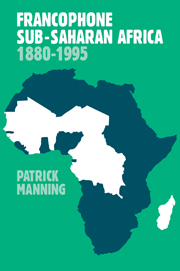Book contents
- Frontmatter
- Contents
- List of illustrations
- Acknowledgments
- Note on the second edition
- Map 1 Francophone sub-Saharan Africa in 1995
- 1 Prologue
- 2 Economy and society, 1880–1940
- 3 Government and politics, 1880–1940
- 4 Culture and religion, 1880–1940
- 5 Economy and society, 1940–1985
- 6 Government and politics, 1940–1985
- 7 Culture and religion, 1940–1985
- 8 Democracy and dependence, 1985–1995
- 9 Epilogue
- Bibliographical essay
- Index
4 - Culture and religion, 1880–1940
Published online by Cambridge University Press: 12 January 2010
- Frontmatter
- Contents
- List of illustrations
- Acknowledgments
- Note on the second edition
- Map 1 Francophone sub-Saharan Africa in 1995
- 1 Prologue
- 2 Economy and society, 1880–1940
- 3 Government and politics, 1880–1940
- 4 Culture and religion, 1880–1940
- 5 Economy and society, 1940–1985
- 6 Government and politics, 1940–1985
- 7 Culture and religion, 1940–1985
- 8 Democracy and dependence, 1985–1995
- 9 Epilogue
- Bibliographical essay
- Index
Summary
The clash of cultures which accompanied the colonization of Africa was very real. The outlooks of European rulers and of their African subjects were so distinct that communication across the cultural boundary was often impossible. For much of the colonial period, French and Belgian observers felt free to dismiss African culture as savage, while Africans in turn labelled their European rulers as destroyers of civilization. Yet within a century a remarkable synthesis of previously antagonistic cultures has emerged. The synthesis is neither complete nor fully comfortable, but there does exist an identifiable francophone African culture, expressed through a mixture of African and European concepts in the French language, and also expressed through the use of French words and concepts in African languages.
The clash of cultures, then, was not an irreconcilable conflict of alien traditions. It was a confrontation of European and African ways, but one in which enough similarities and mutual benefits of the two cultural traditions emerged for them to be combined usefully, though only after debate and transformation. Neither Europe nor Africa had a unified culture. Europe was divided into Catholic, Protestant, and atheist, into elite and popular culture, into radical and conservative political traditions. Africa was divided into Muslim, Christian, and many other religions, into hierarchical and communitarian political traditions, and into many local cultures. The possibilities for combining these elements into a culture to meet the needs of twentieth-century Africa were greater than they first seemed.
- Type
- Chapter
- Information
- Francophone Sub-Saharan Africa 1880–1995 , pp. 86 - 109Publisher: Cambridge University PressPrint publication year: 1999



